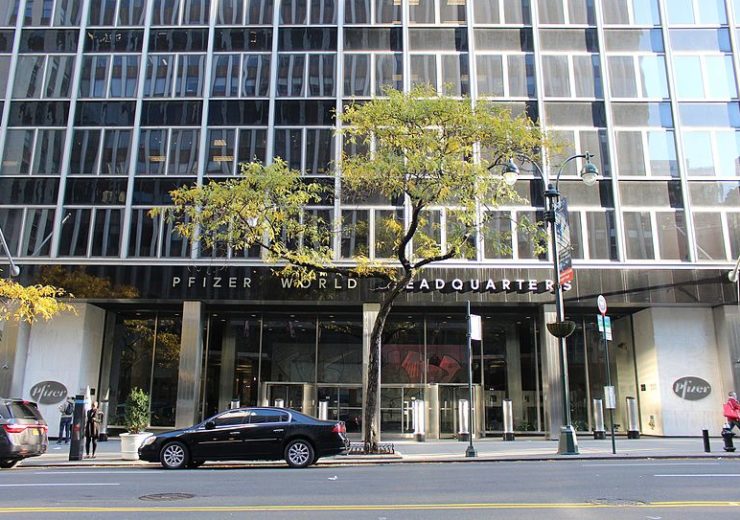JADE MONO-1 is a 12-week, double-blind, randomised parallel group study to evaluate abrocitinib 200mg, abrocitinib 100mg, or placebo

Image: The entrance to Pfizer World Headquarters in Manhattan, New York, US. Photo: Courtesy of Coolcaesar/Wikipedia.
Pfizer has unveiled the complete results from a Phase 3 clinical trial JADE MONO-1 in patients aged 12 years and older with moderate to severe atopic dermatitis (AD).
The US pharma firm said that its Abrocitinib is an investigational oral Janus kinase 1 (JAK1) inhibitor, which is believed to modulate multiple cytokines involved in the pathophysiology of AD, including interleukin (IL)-4, IL-13, IL-31, and interferon gamma.
In February 2018, Abrocitinib was awarded Breakthrough Therapy designation by the US Food and Drug Administration (FDA) for the treatment of patients with moderate to severe AD.
Pfizer global inflammation & immunology product chief development officer Michael Corbo said: “There is a critical need for additional treatment options for patients living with moderate to severe atopic dermatitis.
“We are pleased by these findings, which together with the recently reported positive top-line results from our second Phase 3 trial, encourage us that, if approved, abrocitinib may provide the first oral, once-daily treatment option for these patients.”
JAK1 Atopic Dermatitis Efficacy and Safety (JADE) global development programme
JADE MONO-1 is a 12-week, double-blind, randomised parallel group study to evaluate abrocitinib 200mg, abrocitinib 100mg, or placebo in a total of 387 subjects.
As part of the trial, eligible subjects after completing the 12-week treatment period are allowed to choose whether to enter a long-term extension (LTE) study, or discontinue from treatment. Subjects, who were not eligible for the LTE study, entered a four-week follow up period.
The safety data showed that both abrocitinib 200mg and 100mg were well tolerated and were consistent with a companion study (JADE MONO-2) from the JAK1 Atopic Dermatitis Efficacy and Safety (JADE) global development programme.
The study has reached all the co-primary and key secondary endpoints associated with skin clearance and itch relief, compared to placebo.
The co-primary endpoints of the study include the achieving an Investigator Global Assessment (IGA) score of clear (0) or almost clear (1) skin and two-point or greater improvement relative to baseline and achieving 75% or more change from baseline in Eczema Area and Severity Index (EASI) score.
Achieving a four-point or larger reduction in itch severity measured with the pruritus numerical rating scale (NRS), and decrease in the Pruritus and Symptoms Assessment for Atopic Dermatitis (PSAAD) include the secondary endpoints.
Furthermore, the proportion of patients who achieved a 90% or greater change in EASI score, and the percentage change from baseline in their SCORing Atopic Dermatitis response at all scheduled time points constitute the other secondary endpoints.
The company has presented the study results at the 28th Congress of the European Academy of Dermatology and Venereology (EADV) in Spain.
